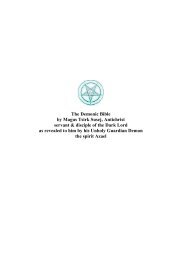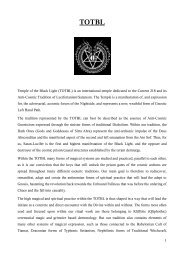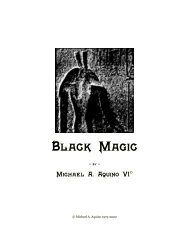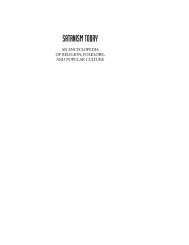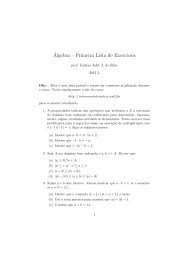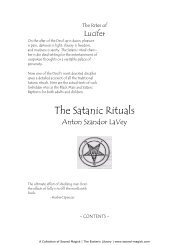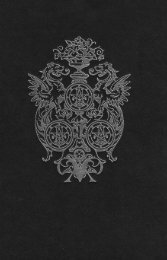I. VAMA MARGA Foundations Of The Left-Hand Path - staticfly.net
I. VAMA MARGA Foundations Of The Left-Hand Path - staticfly.net
I. VAMA MARGA Foundations Of The Left-Hand Path - staticfly.net
You also want an ePaper? Increase the reach of your titles
YUMPU automatically turns print PDFs into web optimized ePapers that Google loves.
implies at least some element of control, either through guidance or<br />
manipulation. It implies, that is, a technique whereby reality is encouraged,<br />
persuaded, induced or coerced to conform to certain specific objectives.<br />
Magic, in short, is the process of exploiting the malleability of reality, and of<br />
shaping it – or alchemically transmuting it – in accordance with given<br />
purposes or goals."<br />
Much as with any consideration of the objective value of artistic creation,<br />
what one magician considers an experience of infinite profundity may seem<br />
entirely worthless or even ridiculous to another magician. For this reason,<br />
among many others, magic is a discipline ill-suited for those who require<br />
hard and fast rules and absolutely verifiable results.<br />
Although we use the word magician in this text to facilitate ease of<br />
communication, it should be noted that those operating outside of a Western<br />
classical cultural framework are not limited to this word to describe<br />
themselves. <strong>The</strong> Sanskrit word siddha is commonly used in India to describe<br />
those who practice magic, and is certainly appropriate to the left-hand path,<br />
considering its sub-continental roots. Related to this word through their<br />
common Indo-European language stream is the Nordic practitioner of seithr,<br />
a left-hand path sex magic of Northern Europe, a Hyperborean shamanism.<br />
From Siberia comes the word shaman, the master of ecstasy whose magic is<br />
achieved while in a state of trance. A multiplicity of other ways to describe<br />
151<br />
the magician can be discovered in the esoteric traditions of the world; a<br />
surprising amount of power can be awakened by locating exactly the right<br />
designation for your practice.<br />
Magic Black And White<br />
A word already fraught with ambiguity and open to interpretation becomes<br />
even mistier when painted a specific color. <strong>The</strong>re are those who insist on<br />
designating this form of magic as "black" and that form as "white." In our<br />
view, this color-coding does nothing but perpetuate very limited and<br />
arbitrary cultural and religious prejudices at the expense of clarity. At its<br />
most simplistic and ignorant level, the black magic/white magic appellation<br />
is connected to the equally primitive good/evil dichotomy. Since we<br />
attribute no objective meaning whatsoever to the terms "good" and "evil", it<br />
only follows that we must reject the popular consideration of black magic as<br />
magic performed in the service of Evil and white magic as magic that<br />
perpetuates the Good. Ancient Greek magi, despite their relative lack of<br />
moral judgment, described practices intended to harm, bind or hypnotize as<br />
kakotechnia, "the evil art". This concept can he compared to the common<br />
Indian description of Tantric left-hand path magic – especially the<br />
previously described six malevolent rites – as Abichara.<br />
Historically, the phrase black magic seems to have been devised by<br />
the alchemist Albertus Magnus, the thirteenth century mage who proposed<br />
that black magic was the "demonic" opposite of a benevolent natural magic,<br />
which he attributed to heavenly angelic powers. <strong>The</strong> twentieth century mage<br />
Gurdjieff, often denigrated as a black magician by his detractors, proposed a<br />
typically idiosyncratic definition of black magic, describing it as "a<br />
falsification, an imitation of the outward appearance of 'doing'." For those<br />
magicians whose identity formation demands a simple, easily grasped label,<br />
the roles of black magician and white magician are attractive categorizations<br />
requiring a bare minimum of thought to adopt. Self-described black<br />
magicians, enamoured of popular conceptions of the allure of evil, and<br />
usually motivated by a need to prove their social defiance, can step into an<br />
instant one-size-fits-all subcultural role satisfying the need for easy rebellion.<br />
At the other extreme, the self-described white magician, who is often<br />
compelled to prove his or her social acceptability, can pat themselves heartily<br />
on their hacks for becoming such benevolent beings. Both tactics reduce the<br />
complex multiverse of magical operations to a cartoon level. If such




